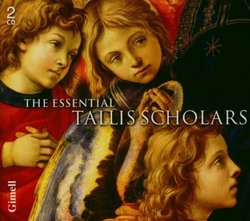| All Artists: Gregorio Allegri, Tomas Luis de Victoria, Giovanni Pierluigi da Palestrina, Josquin Desprez, Thomas Crecquillon, Jacobus Clemens Non Papa, Heinrich Isaac, Cipriano de Rore, Orlande de Lassus, Antoine Brumel, John [Composer] Sheppard, Thomas [Composer] Tallis, Robert White, William Cornysh, William [Composer] Byrd, The Tallis Scholars Title: The Essential Tallis Scholars Members Wishing: 0 Total Copies: 0 Label: Gimell UK Release Date: 9/9/2003 Album Type: Import Genres: Special Interest, Pop, Classical Styles: Vocal Pop, Opera & Classical Vocal, Chamber Music, Historical Periods, Baroque (c.1600-1750), Classical (c.1770-1830) Number of Discs: 2 SwapaCD Credits: 2 UPC: 755138120129 |
Search - Gregorio Allegri, Tomas Luis de Victoria, Giovanni Pierluigi da Palestrina :: The Essential Tallis Scholars
 | Gregorio Allegri, Tomas Luis de Victoria, Giovanni Pierluigi da Palestrina The Essential Tallis Scholars Genres: Special Interest, Pop, Classical
|
Larger Image |
CD Details |
CD ReviewsA real gem of sacred Renaissance music Boileau0663 | Tournai, Belgique | 12/28/2003 (5 out of 5 stars) "I can't even begin to understand why this wonderful album, a selection from recordings of the renowned Tallis scholars starting in 1980, has remained without reviews so far. Let me tell all lovers of Renaissance music and choral music in general that this album is one of the best in its kind. For me, it is even superior to the overblown "The Best of the Renaissance" (also by the Tallis scholars). The enchantment begins wit the cds themselves, exquisitely decorated with a reproduction of the Vision of St Bernhard of Clairvaux by Renaissance painter Filippino Lippi. The plastic box is protected by a beautiful, glossy paper cover featuring cherubs absorbed in contemplation. Inside you will find a booklet containing the Latin texts of the chants translated in English, French and German (which is not the case with "The Best of the renaissance")together with a presentation-illustrated with photographs-of the Tallis scholars and the music of the album. Although this is a compilation of different recordings extending over a dozen years or so, I would like to emphasize that there is not the slightest difference in sound quality between the various tracks. One of the strong point of this album is the great variety of the sung pieces. Whereas "The Best of the Renaissance" features no less than 3 Masses (by Byrd, Desprez and Palestrina), which means hearing again and again Kyrie, Gloria, Credo, Sanctus and Agnus, this album offers a whole range of motets and hymns with a few major Mass pieces like the final Gloria by Brumel on the first cd, whose splendor almost puts it on a par with the gorgeous "Spem in Alium" by Thomas Tallis. Maybe the only weakness of this album is the choice of the composers, many of whom are rather obscure Flemish and English composers (who knows Crecquillon Isaac, Clemens, Cornysh, Sheppard, Rore, White?), although great names like Allegri, Byrd Palestrina, Lassus Victoria, Tallis and Desprez are also represented. But the music is splendid all along and,last but not least, in this recording you are spared the experimental music of pretentious Gesualdo, which in my opinion spoils "The Best of the Renaissance"." The most delicate music of all time N. Piplica | 12/29/2004 (5 out of 5 stars) "i truely recommend this cd. i'm 19, grew up with metal, rock, n rap. But this is truelly the most delicate music, makes earth feel like heaven. it has changed my life, n hopefully changes yours. The music takes you farther than you will ever be as a human, farther than ur wildest dream. Listen and take the path of splendid creations. Nick" Behold, The Wonder Of Man Darken Mantius | Or, USA | 08/14/2004 (5 out of 5 stars) "Can any one believe the beauty of this music, the clarity of these voices, and the intonation resounding in every breath that they take. If this is not heaven on earth, and it already feels like it is, then we shall all be humbled to tears when we hear the angels choir. But i, for one, say that the Tallis Scholars are truly angels on earth, and their voices are proof of that. I am shocked that this cd has recieved 2 reviews, and am writing this to tell you, that you need to buy this cd, and listen to the clarity of voice that it bestows upon the mind."
|

 Track Listings (12) - Disc #1
Track Listings (12) - Disc #1